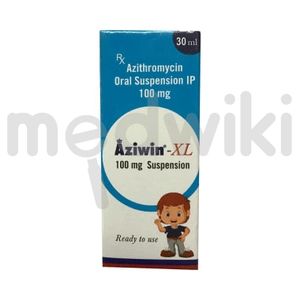azimid
Introduction to Azimid
Azimid is a widely recognized antibiotic medication primarily used to treat various bacterial infections. It belongs to the macrolide class of antibiotics, known for its effectiveness in stopping the growth of bacteria. Azimid is particularly useful in treating respiratory infections, skin infections, ear infections, and sexually transmitted diseases. Its active ingredient, Azithromycin, is known for its broad-spectrum antibacterial activity, making it a preferred choice for healthcare professionals. Azimid is available in various forms, including tablets, capsules, and oral suspension (syrup), providing flexibility in administration based on patient needs.
Composition of Azimid
The active ingredient in Azimid is Azithromycin, which is present in a concentration of 100mg/5ml in its oral suspension form. Azithromycin works by inhibiting the synthesis of essential proteins required by bacteria to grow and multiply. By interfering with this process, Azithromycin effectively halts the proliferation of bacteria, allowing the immune system to eliminate the infection. This action makes Azimid a potent antibiotic against a wide range of bacterial strains.
Uses for Azimid
Azimid is prescribed for the treatment of various bacterial infections. Some of its primary uses include:
- Treatment of respiratory tract infections such as bronchitis and pneumonia
- Management of skin and soft tissue infections
- Effective against ear infections like otitis media
- Treatment of sexually transmitted infections, including chlamydia
- Management of sinus infections
Side Effects of Azimid
While Azimid is generally well-tolerated, some patients may experience side effects, including:
- Nausea and vomiting
- Diarrhea
- Abdominal pain
- Headache
- Dizziness
- Allergic reactions such as rash or itching
Precautions for Azimid
Before taking Azimid, it's important to consider the following precautions:
- Inform your healthcare provider about any allergies to Azithromycin or other antibiotics.
- Discuss any existing medical conditions, especially liver or kidney disease.
- Inform your doctor if you are pregnant, planning to become pregnant, or breastfeeding.
- Avoid taking Azimid with antacids containing aluminum or magnesium, as they can reduce its effectiveness.
- Complete the full course of treatment as prescribed, even if symptoms improve, to prevent antibiotic resistance.
Conclusion
Azimid is a versatile antibiotic effective in treating a variety of bacterial infections. With its active ingredient, Azithromycin, it offers a reliable solution for patients needing antibacterial therapy. Available in multiple forms such as tablets, capsules, and syrup, Azimid provides flexibility in treatment options. Always follow your healthcare provider’s instructions and take necessary precautions to ensure the best outcomes. If you experience any side effects or have concerns, consult your healthcare professional promptly.
Similar Medicines
More medicines by Bioplasmid Healthcare
Available in 2 variations

Azimid 100mg Oral Suspension
bottle of 15 ml Oral Suspension

Azimid 250mg Tablet
strip of 6 tablets
Disclaimer : This information is not a substitute for medical advice. Consult your healthcare provider before making any changes to your treatment . Do not ignore or delay professional medical advice based on anything you have seen or read on Medwiki.
azimid
Prescription Required
Manufacturer :
Bioplasmid HealthcareComposition :
azithromycin











.svg)
